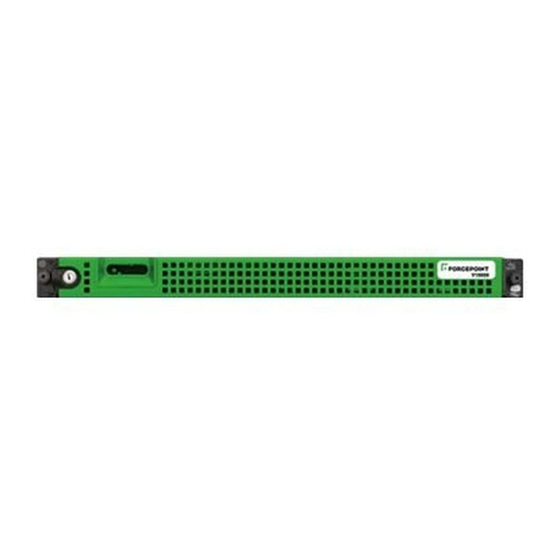
Table of Contents
Advertisement
Quick Links
Quick Start Guide
Forcepoint V5000 G4
Web or Email Security Appliance
Before you begin...
Plan your deployment before setting up the appliance. See the
back of this guide for a deployment overview and reference sheet.
1
Verify Contents
Ethernet Cables (4)
Power Cable
Bezel (faceplate)
Optional Sliding Ready Rail Kit available. Contact your
Forcepoint account representative.
Contact Forcepoint Technical Support if any items are missing.
Rack Installation
2
To rack the V5000 appliance, use a rack tray (not included).
1. Obtain a rack tray and install into desired server rack.
2. Place appliance on tray
and secure to server rack
using mounting screws on
front of appliance.
©2017 Forcepoint LLC. All rights reserved.
3
Determine Security Mode
The appliance supports the following security modes:
• Web (Forcepoint Web Security or Forcepoint URL Filtering)
• Email (Forcepoint Email Security)
Based on your subscription and deployment plan, determine the appropriate security mode for this
appliance.
4
Connect Network Cables
Connect the appliance interfaces required by the security mode for this appliance. Cat 5E cables (or
better) are required. Do not use crossover network cables.
*Not used for Forcepoint URL Filtering.
Serial Cable
5
Connect Input Device & Power On
Serial Port Connection
Connect a computer to serial port using null
modem cable (provided). Or, connect a terminal
server to serial port using a straight-through
cable (not provided). Serial port settings are:
9600 baud, 8 bits, no parity.
OR
Keyboard/Monitor Connection
Connect a monitor and keyboard to appliance,
either directly or through a KVM (keyboard/
video/mouse) switch.
Power On Appliance
6
Power on the appliance and check the following indicators:
Front
• Power button is illuminated.
Rear
• LEDs for connected interfaces (NICs) are green.
• System status indicator (LED left of power supplies) is solid
blue.
Contact Forcepoint Technical Support if any indicators are not
illuminated correctly.
7
Configuration Overview
Please refer to the Forcepoint Appliances Getting Started guide
for more details.
Initial Configuration
Firstboot Script
• Configure security mode.
• Configure the appliance management communication
interface (C).
• Configure NTP servers/system time.
Appliance Command Line
• Configure applicable network interfaces.
• Configure other settings as desired.
Web Mode
Forcepoint Security Manager
• Enter subscription key, update Master Database, configure
Network Agent, and configure policies in Forcepoint
Security Manager.
• Requires Windows Server 2008 R2, or Windows Server 2012
or 2012 R2, or Windows Server 2016.
Content Gateway Manager (proxy)
• If your site uses the Forcepoint proxy, configure user
authentication and select protocols.
Email Mode
Forcepoint Security Manager
• Complete configuration wizard, enter subscription key, and
configure policies in the Email Security module. Configure
email DLP policies in the Data Security module.
• Requires Windows Server 2008 R2, or Windows Server 2012
or 2012 R2, or Windows Server 2016.
G4
QSG230-100_RevC
Advertisement
Table of Contents

Subscribe to Our Youtube Channel
Summary of Contents for Forcepoint V5000 G4
-
Page 1: Before You Begin
2012 R2, or Windows Server 2016. 1. Obtain a rack tray and install into desired server rack. Content Gateway Manager (proxy) • If your site uses the Forcepoint proxy, configure user Connect Input Device & Power On authentication and select protocols. -
Page 2: Network Configuration
A separate computer with Windows Server is required for running Forcepoint Security Manager. See the Forcepoint Appliances Getting Started guide for details. C Interface IP: Hostname: admin is the default user name for the Appliance CLI, Forcepoint Security Manager, and Content Gateway Manager. Internet Network Configuration Appliance Management Communication Interface (C)















Need help?
Do you have a question about the V5000 G4 and is the answer not in the manual?
Questions and answers